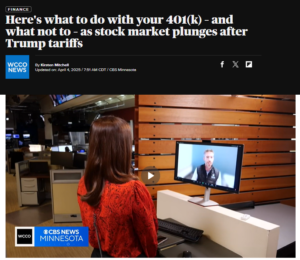
Market Update for April 3, 2025
President Trump’s reciprocal tariffs, announced on April 2nd, were broadly more aggressive than the market had anticipated, leading to heightened levels of uncertainty.
Please find our key points below:
- Our broadly diversified portfolios have held up well year to date, despite heightened levels of uncertainty.
- While more aggressive than previously anticipated, yesterday’s reciprocal tariff announcement does provide a framework and represents a potential ceiling for tariff rates.
- Underlying economic fundamentals remain resilient, and current policy uncertainty is unlikely to derail the economy, though it is likely to weigh negatively on short-term growth.
- We continue to monitor developments closely. To the extent uncertainty and heightened volatility persists, we believe it may offer us enhanced rebalancing opportunities.
Reciprocal Tariff Announcement
On April 2, 2025, President Trump announced a two-part reciprocal tariff plan.
- A 10% baseline tariff, set to take effect April 5th, will be applied to imports from all countries, excluding Canada and Mexico.
- An additional tariff, set to take effect April 9th, will be applied to most major trading partners that equals half the ratio of bilateral trade deficit with the country divided by imports from that respective country.
Indications are that the base rate 10% tariff is unlikely to be negotiated lower; however, the additional tariffs could be reduced through negotiations with those trading partners.
The reciprocal tariff announcement, while more aggressive than many had anticipated, does provide a framework from which the global economy can work from moving forward. It provides a starting point and a potential ceiling for the level of tariffs that may be lowered as negotiations with various countries transpire. As such, actual tariffs on trading partners may eventually settle at a lower level. However, tariffs could be increased should countries pursue retaliatory policies.
Any Retaliation May Be Measured
How countries react to yesterday’s announcement will be key. On the one hand, Mexico’s President Sheinbaum touted Mexico’s solid relationship with the U.S.; on the other hand, China called on President Trump to withdraw the additional tariffs or face countermeasures. Some countries may pursue some level of retaliation. Local politics may force this. However, we believe any retaliatory measures are likely to be relatively measured, for the simple fact that any retaliation may end up hurting those countries more than the countermeasures hurt the U.S. For this reason, we believe many countries are unlikely to want to pursue a tit-for-tat trade war with the U.S.
Also likely are negotiations, though these discussions will take some time to play out: negotiations with all impacted countries will not happen overnight. However, any positive negotiation developments or announcements reducing tariff levels from the originally announced baseline level may help sentiment.
Economic Impact of Tariffs
Hard economic data remains relatively robust; however soft data, like consumer sentiment, has deteriorated in the face of the current uncertainty. The trillion-dollar question is whether the deterioration in sentiment leads to a decline in hard economic data, which we have yet to see.
Leading into this latest tariff announcement, the general anticipation was for 2025 economic growth to come in around 1.5%. Economic growth is likely to be revised lower, though still positive, for the year. The current levels of uncertainty are not expected to cause a recession given the resilient nature of the underlying economy, though the risks of a recession have certainly increased.
Despite current levels of uncertainty, the underlying economy remains relatively robust, with strong household and corporate balance sheets. Underlying business fundamentals remain relatively strong, and we do not see any major dislocations or excesses built up in the economy. Economic excesses are what tend to precipitate downward risks to economic growth. Potential forthcoming income tax reform may also help to offset the impact of current policy uncertainty, however that is yet to be determined and is unlikely to be finalized for several months.
In short, we anticipate that the current policy will not derail the economy, though it is likely to negatively impact short-term growth.
According to a recent article, many Americans are seeing their retirement savings, particularly in 401(k) plans, take a hit. CBS News Minnesota interviewed Mission Wealth Senior Wealth Advisor Jon DeMoss about steps to take if you feel uneasy. DeMoss says the key to weathering market downturns is a focus on individual financial goals. You can watch the full interview by clicking the link or image above.
Importance of Diversification
As previously mentioned, broadly diversified portfolios have held up relatively well year to date, with major asset classes outside of U.S. stocks performing positively.
International and emerging market stocks remain positive so far this year (despite the substantial increase in trade tensions). Real estate, private equity, the broad bond market, and direct lending strategies have all generated positive returns. As a result, Mission Wealth’s broadly diversified portfolios have held up well year to date, despite the heightened levels of uncertainty.
Join Our Upcoming Webinar on Private Equity and Private Credit
Please register for our upcoming webinar with Cliffwater’s Philip Hasbrouck here.
We continue to monitor developments closely. To the extent uncertainty and heightened volatility persists, we may have enhanced rebalancing opportunities to add to high-quality assets at relatively cheap entry prices, which in turn may help underpin long-term portfolio returns.
Customized Investment Management Solutions
At Mission Wealth, we develop customized, globally diversified, tax-efficient portfolios tailored to your financial plan and built to stand the test of time. Contact us below for a free portfolio review.Investment Advice Fit For Your Needs
At Mission Wealth, we are deeply rooted in an evidence-based investment strategy built on decades of Nobel Prize-winning research. We ignore the media noise and Wall Street hype, relying instead on a long-term approach and proven principles that reward investors over time. For more information on Mission Wealth's investment strategies, please visit missionwealth.com.
To meet with a Mission Wealth financial advisor, please contact us online today or call us at (805) 882-2360.
Let's Keep in Touch!
Subscribe for exclusive content and timely tips to empower you on your financial journey. Our communications go straight into your inbox, so you'll never miss out on expert advice that can positively impact your life.Recent Investment Insights Articles

Market Update 8/22/25: Powell’s Jackson Hole Remarks Signal Possible Fed Rate Cuts Ahead
August 22, 2025
Market Perspectives Q3 2025
August 14, 2025




